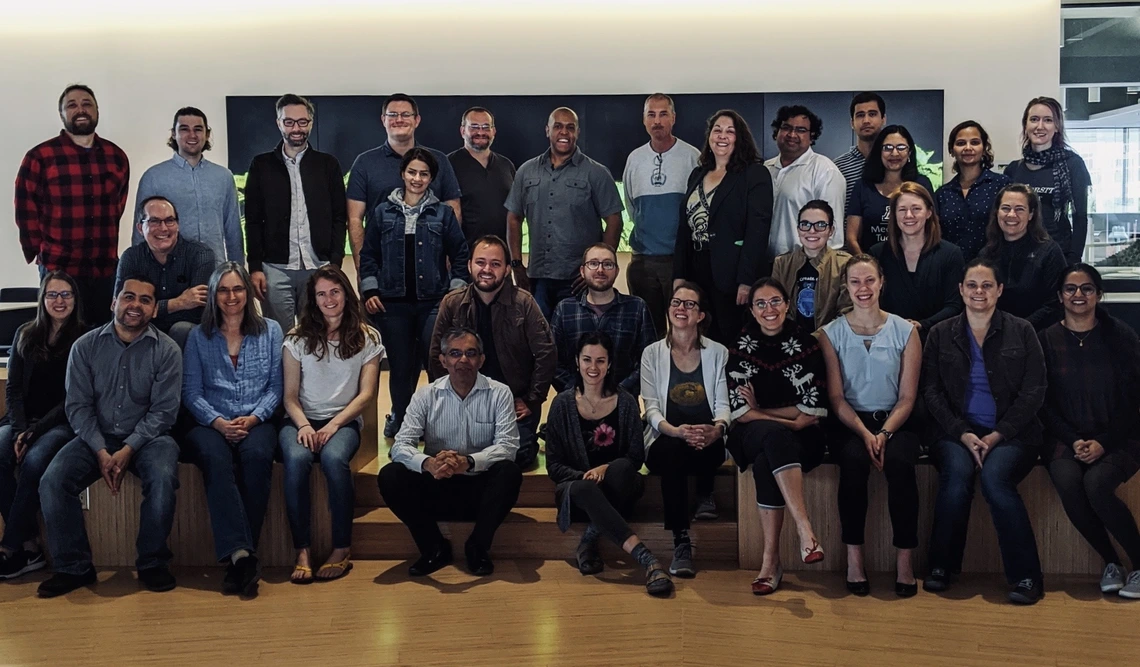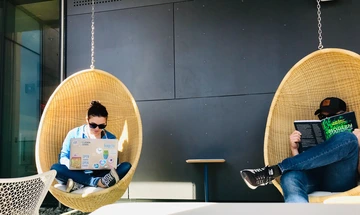FOSS 2020
Foundational Open Science Skills Workshop

Group Photo of FOSS 2020 Attendees
This year I was lucky enough to attend the second CyVerse Foundational Open Science Skills (FOSS) camp, which took place here at the University of Arizona during the week of February 17, 2020. The focus of this week-long workshop was to give attendees the tools to start practicing open science, collaborative research, and open data science. I encourage you to check out the agenda and accompanying training material, as it includes many excellent resources which I will continue to use for reference.
Some of the FOSS attendees came from far away lands with actual winters, and the Arizona weather did not disappoint, allowing for such activities as having lunch on the balcony in the sunshine while learning about how to prepare excellent NSF proposals with former NSF Program Director, Eric Lyons.

Emily and Ryan enjoying the Arizona winter on the balcony of the Health Sciences Innovation Building (HSIB)
In addition to the lovely weather, I enjoyed learning about the wide range of topics for enabling and promoting open science. Workshop attendees had a variety of technical and research experience, ranging from collecting, managing, and publishing data to transforming data downstream in Python and R for machine learning. It was helpful for me to learn about data management plans, generating machine-readable metadata, and ensuring your project’s data are FAIR. These are essential tasks for working with open data and are being put into practice with our team’s machine learning project.
For me, one of the highlights of FOSS was learning the ways in which teams can improve their communication and collaboration outcomes. Michael Mandel from the University of Arizona’s Eller College of Management came to work with us for one morning and followed up another afternoon. We worked on our communication with competitive Lego-building teams, learned about our People Styles at Work, and how different but complementary work styles of team members can be leveraged for effective teamwork. I discovered that I have an Amiable work style, while one of our other CCT Data Science team members Ryan Bartelme - a Data Science Fellow who assisted with the workshop - is a Driver. Discovering my work style has helped me define my strengths and also areas for improvement. Since the CCT Data Science team is small but growing and also includes our remote team member Kristina Riemer, I thought it would be helpful and also fun to work more with Michael, as we’re always looking for ways to improve our productivity through better group management and communication.
The key takeaway from FOSS is that open science is a learnable skill that can be implemented in many aspects of the scientific process. Sharing and publishing your code and data for how you achieved a specific result, for example, is essential for reproducibility, even if it may feel different and at times difficult to put all of your work “out there.” This includes everything from Docker containers for reproducible science, licensing that allows others to share and improve upon your research and software, and applying FAIR principles to your data. These are just a few of the many working parts that need to come together for open science. And while a collaborative and open culture between researchers, software engineers, lab technicians, citizen scientists, and beyond may require a bit more work, I believe this is the best way to truly stand on the shoulders of giants.

